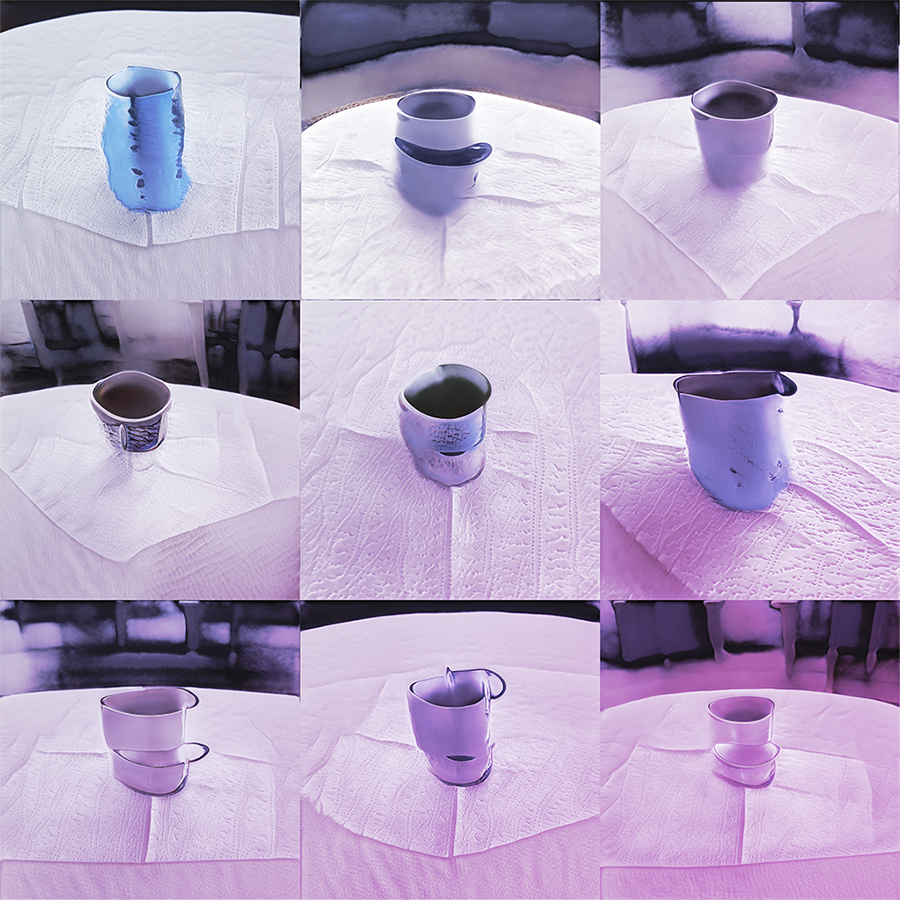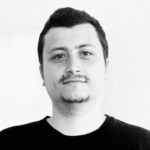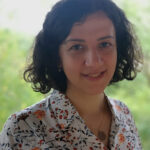
Description:
Required Skills: Python Beginner. No prior knowledge is required on 3D spatial data generation.
Required Software: Zoom, Discord, Google Drive, Google Colab Pro, AgiSoft, GIMP/Adobe Photoshop
Required Hardware: PC Laptop, photomachine or cell phone
Maximum number of participating students: 100
The Homeomorphic Formations workshop concentrates on everyday life objects and their homeomorphic transformations via deep learning-based generative models and their novel formations through 3D spatial data generation methods. How artificial intelligence informs our everyday life will be explored through the topologies of everyday life objects like household objects and how novel forms can be generated through this information will be questioned throughout the workshop. We will have lectures on AI, dataset preparation, and topology of form. We will have tutorials for training a neural network and 3D spatial data generation. 2D digital images will be generated by training Generative Adversarial Networks via StyleGAN-2-ADA and afterward, these images will be used to generate 3D spatial data. At the end of the workshop, each participant will be able to generate their own homeomorphic household object formations. Learning objectives and outcomes of the workshop are: (1) to introduce the basic vocabulary of artificial intelligence (2) to introduce the basic knowledge on data gathering and processing (3) to experience a deep learning-based generative model: Generative Adversarial Networks (GAN) and its potentials for form searching/finding (4) to examine the everyday life objects’ topological relationships (5) to introduce and experience methods for 3D spatial data generation
Schedule:
timezone: (GMT +3:00) Baghdad, Riyadh, Moscow, St. Petersburg| Start time | End time | Description |
|---|---|---|
| 2022-06-28 - 10:30 | 2022-06-28 - 14:00 | Introduction to Topology and Homeomorphism, AI, ML and GAN-- Data Gathering and Processing-- Assignment: Data Gathering and Processing-Everyday life objects Photoshoots |
| 2022-06-29 - 10:30 | 2022-06-29 - 14:00 | Introduction to Google Colab-- Training Deep Learning Model on Google Colab-- Assignment: Training the model through the gathered data (12 hours) |
| 2022-06-30 - 10:30 | 2022-06-30 - 14:00 | Exploration of Latent Space-- 2D Data Generation for 3D Spatial Data Modeling-- Introduction to Agisoft Software-- 3D Model Generation |
Instructors:
 |
Ayşegül Akçay Kavakoglu | Ayşegül Akçay Kavakoğlu is an architect and assistant professor in the Faculty of Architecture, Department of Landscape Architecture at Istanbul Technical University. She is also an academic member of the Architectural Design Computing Program at ITU and Design Advisory Committee of IT Valley, Turkey. Her research interests involve design process, computational design, moving image studies and lately, artificial intelligence. (BArch/DEU, MArch/METU/ÉNSA-PB, PhD/METU). |
 |
Can Uzun | Can Uzun is an assistant professor at Altınbaş University. He received his MSc.(2015) in Architectural Design program and Ph.D. (2020) in Architectural Design Computing program at ITU. He presented his Ph.D. Thesis with the title of “A Study On Interactıon Of AI And Archıtecture: Productıon And Evaluatıon Of Archıtectural Plan Wıth Generatıve Adversarıal Networks.” He carried out research projects on VR, AR, AI, and design cognition. His main research interest is machine learning algorithms and data in architecture. (BArch/ITU, MSc/ITU, PhD/ITU). |
 |
Asena Kumsalsen | Asena Kumsal Şen received her Ph.D. (2015) degree in Architectural Design Program at Istanbul Technical University (ITU) and currently is an assistant professor at Maltepe University, architecture. Her major areas of interest are design pedagogy, design theory, and digital fabrication. |
 |
Sema Alaçam | Sema Alaçam is an associate professor at Istanbul Technical University (ITU), Faculty of Architecture, where she is also the Department Vice Chair at Faculty of Architecture, Department of Architecture. She has research experience from TU Delft, Hyperbody Research Group, ETH Zurich, Chair of Structural Design, University of Oregon, Department of Philosophy and Université de Versailles Saint-Quentin-en-Yvelines. She teaches various graduate courses related to the computational design and digital fabrication approaches in architecture. |
 |
Orkan Guzelci | Orkan Zeynel Güzelci received his BArch (2010) degree in Architecture at Istanbul Kultur University, MSc (2012) degree in Architectural Design Program, and PhD (2018) degree in Architectural Design Computing Program at Istanbul Technical University. In 2020, he joined Digital Fabrication Laboratory (DFL) at the Faculty of Architecture of the University of Porto (FAUP) as a Post Doctoral Researcher and completed Post Doctoral Program in Architecture in 2021. He is still conducting his research activities at FAUP/DFL and teaching graduate courses at Istanbul Technical University. His current research topics are computational design pedagogy, augmented reality assisted fabrication, and applications of machine learning in architecture. |
Disclaimer:
All workshops will accept 100 applications MAX.
